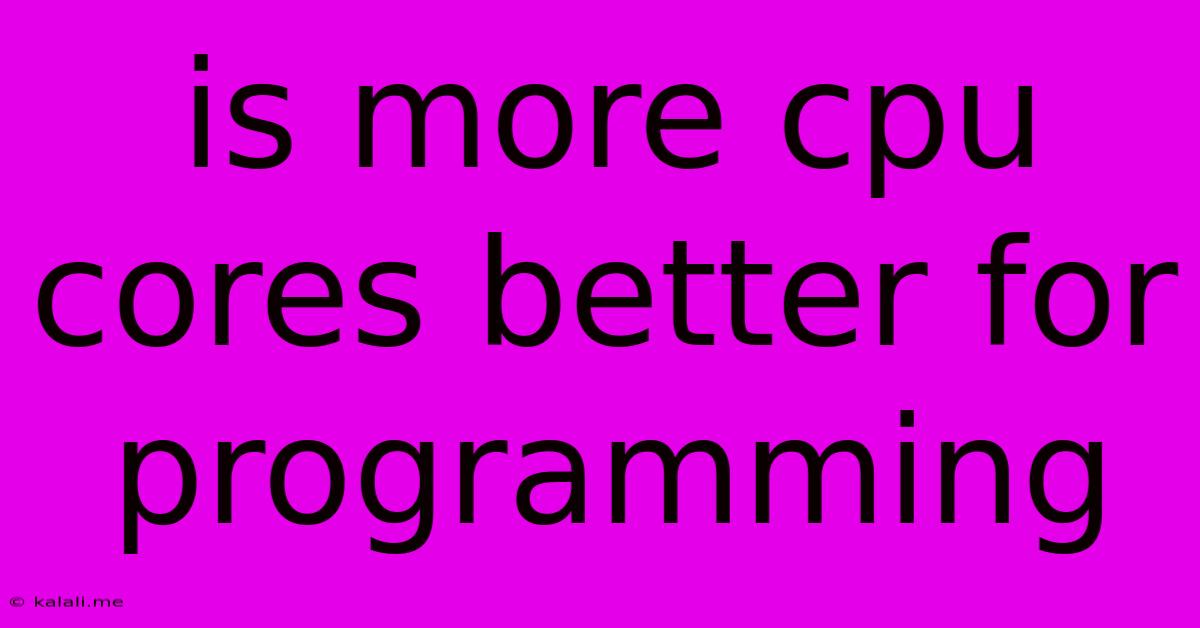Is More Cpu Cores Better For Programming
Kalali
Jun 03, 2025 · 3 min read

Table of Contents
Is More CPU Cores Better for Programming? A Deep Dive
Meta Description: Discover if more CPU cores truly benefit programmers. This article explores the impact of multi-core processors on various programming tasks, from compilation to running applications, offering insights for developers choosing their next machine.
Choosing the right computer for programming can be tricky. One crucial spec often debated is the number of CPU cores. While more cores often mean higher price, the question remains: do they significantly improve your programming experience? The answer, as with most things in computing, is nuanced and depends heavily on your workflow.
Understanding CPU Cores and Their Role
A CPU core is essentially a processing unit within your central processing unit. Think of each core as a separate brain capable of executing instructions. A single-core processor can handle one task at a time, while a multi-core processor can handle multiple tasks concurrently. This concurrency is key when discussing its impact on programming.
Where More Cores Shine
Several programming tasks benefit significantly from multi-core processors:
-
Compilation: Compiling large projects, especially those written in languages like C++ or Java, can be incredibly time-consuming. Multi-core CPUs can significantly speed up this process by distributing the compilation workload across multiple cores. This leads to faster build times and a more efficient development cycle. You'll notice the difference particularly when working with large codebases or complex projects.
-
Running Virtual Machines (VMs): Many programmers use VMs for testing and development. Each VM requires processing power. Having multiple cores allows you to run several VMs simultaneously without experiencing significant performance degradation, enabling more efficient parallel testing and development across different environments.
-
Parallel Processing Tasks: If your programming involves tasks that can be broken down into smaller, independent units, like image processing, scientific computing, or machine learning, a multi-core CPU allows for true parallel processing, drastically reducing overall execution time. This parallelization can dramatically improve performance, enabling faster results and greater efficiency.
-
Background Processes: Even without explicitly parallel code, having multiple cores allows background tasks like code analysis tools (linters, formatters), IDE indexing, and version control operations to run without slowing down your primary development tasks. This leads to a smoother, more responsive development environment.
When More Cores Don't Necessarily Matter
While multi-core processors offer advantages, it's important to acknowledge situations where more cores won't necessarily translate to a noticeable performance boost:
-
Single-Threaded Applications: Many applications, especially those not specifically designed for multi-core processing, primarily utilize a single core. In these cases, a higher clock speed (processing speed of a single core) might be more beneficial than a higher core count.
-
I/O-Bound Tasks: If your programming work is heavily reliant on input/output operations (like reading from a hard drive or network), the CPU might spend a significant portion of its time waiting for data. In these scenarios, the number of cores has less of an impact than the speed of the storage and network devices.
-
Memory Bottlenecks: If your system's memory (RAM) is insufficient, adding more cores won't necessarily improve performance. The CPU might spend more time waiting for data to be fetched from memory, negating the benefits of extra cores.
Choosing the Right Processor: Core Count vs. Other Factors
The ideal number of cores depends on your specific needs. Consider these factors:
-
Type of programming: Are you working on large-scale projects requiring extensive compilation and parallel processing, or smaller, single-threaded applications?
-
Budget: More cores generally mean a higher price.
-
Other system components: Balance your CPU choice with sufficient RAM and fast storage for optimal performance.
In conclusion, while more CPU cores can significantly benefit programmers, particularly those working on parallel processing tasks or large projects, it's not always the most crucial factor. Carefully consider your specific workflow and budget to make an informed decision that best suits your needs. Focusing on a balance of core count, clock speed, and other system components will result in the best overall programming experience.
Latest Posts
Latest Posts
-
How Do I Copy Contacts From Android To Iphone
Jun 05, 2025
-
How Man Postgres Connection Are Good
Jun 05, 2025
-
How Do You Pronounce S U B T L E
Jun 05, 2025
-
Factorio How To Put Sometihg In Front Of Queue
Jun 05, 2025
-
Can You Use Rice Vinegar Instead Of White Vinegar
Jun 05, 2025
Related Post
Thank you for visiting our website which covers about Is More Cpu Cores Better For Programming . We hope the information provided has been useful to you. Feel free to contact us if you have any questions or need further assistance. See you next time and don't miss to bookmark.